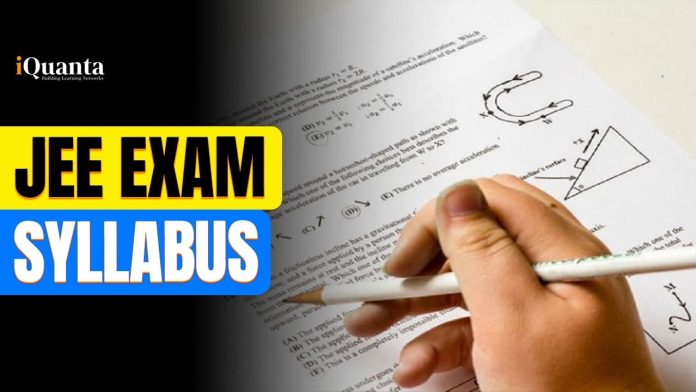This article discusses the revised IIT JEE exam syllabus for 2026 in detail, covering both JEE mains and JEE advanced syllabus in a detailed manner. Embarking on the journey towards cracking the IIT JEE exam demands a comprehensive understanding of its syllabus. The IIT JEE exam syllabus acts as the guiding article for numerous engineering aspirants, bringing together the vast expanse of topics and concepts aspiring candidates must master. From fundamental principles in Physics, Chemistry, and Mathematics to advanced problem-solving techniques, each aspect of the syllabus is carefully engineered to challenge and refine the skills of IIT JEE test-takers. In this blog, we delve into the intricacies of the IIT JEE exam syllabus, unraveling its complexities and offering insights to aid aspirants in their quest for excellence.

Join this free JEE Prep Group to Get Free Study Material, Preparation Strategy by Toppers, Latest Updates and More!
JEE Mains Exam
The JEE Mains exam serves as a standardized computerized assessment for admissions into B.Tech and B.Arch programs at NITs (National Institutes of Technology) and IIITs (Indian Institutes of Information Technology). It consists of two papers: Paper 1, for B.E/B.Tech aspirants, covers Physics, Chemistry, and Mathematics; Paper 2, tailored for B.Arch/B.Planning aspirants, is divided into two sections. Section 2a, for B.Arch, includes Mathematics, Aptitude, and Drawing, while Section 2b, for B.Planning, includes Mathematics, Aptitude, and Planning-related questions. The exam format primarily comprises multiple-choice questions (MCQs), and the top 2.5 lakh students from the JEE Mains qualify for the subsequent JEE Advanced exam.
Enroll for IIT Online Coaching by iQuanta
JEE Mains Syllabus 2026
The IIT JEE Mains syllabus is segregated into 3 sections, namely, Physics, Chemistry and Mathematics. Lets understand the IIT JEE Exam Syllabus in detail.
JEE Mains Syllabus: Physics
- Physics And Measurement
- Kinematics*
- Laws Of Motion*
- Work, Energy and Power
- Rotational Motion
- Gravitation
- Properties Of Solids And Liquids
- Thermodynamics*
- Kinetic Theory Of Gases*
- Oscillations And Waves
- Electrostatics
- Current Electricity*
- Magnetic Effects of Current and Magnetism*
- Electromagnetic Induction and Alternating Currents
- Electromagnetic Waves*
- Optics*
- Dual Nature of Matter and Radiation
- Atoms & Nuclei
- Electronic Devices
- Experimental Skills (20% weightage)
* Higher weightage in last couple of years.
JEE Mains Syllabus 2026: Chemistry
Physical Chemistry
- Basic Concepts
- Atomic Structure*
- Chemical Bonding And Molecular Structure*
- Chemical Thermodynamics
- Solutions
- Equilibrium*
- Redox Reactions And Electrochemistry
- Chemical Kinetics
* Higher weightage in last couple of years.
Inorganic Chemistry
- Classification of Elements and Periodicity in Properties
- P-block elements (group 13-18)*
- d & f-block elements
- Co-ordination Compounds
* Higher weightage in last couple of years.
Organic Chemistry
- Purification And Characterization Of Organic Compounds
- Some Basic Principles Of Organic Chemistry
- Hydrocarbons
- Organic Compounds Containing Halogens
- Organic Compounds Containing Oxygen
- Organic Compounds Containing Nitrogen
- Biomolecules
- Principles Related To Practical Chemistry
* Higher weightage in last couple of years.
JEE Mains Syllabus: Mathematics
- Sets, Relations, And Functions
- Complex Numbers And Quadratic Equations
- Matrices And Determinants*
- Permutations And Combinations
- Binomial Theorem And Its Simple Applications
- Sequence And Series*
- Limit, Continuity, And Differentiability
- Integral Calculus
- Differential Equations
- Co-Ordinate Geometry*
- Three Dimensional Geometry*
- Vector Algebra
- Statistics And Probability
- Trigonometry
* Higher weightage in last couple of years.

Join this free JEE Prep Group to Get Free Study Material, Preparation Strategy by Toppers, Latest Updates and More!
JEE Advanced Exam 2026
The JEE Advanced exam is a nationwide entrance test in India, aimed at securing admission to various undergraduate programs, particularly in engineering, at the prestigious institutions like the Indian Institutes of Technology (IITs) and the Indian School of Mines (ISM). A student is allowed a maximum number of 2 attempts in 2 consecutive years. Eligibility to sit for the JEE Advanced is reserved for candidates who have successfully passed the JEE Mains and ranked among the top performers. The exam is known to be framed to reject candidates rather than accept them. Renowned for its difficulty and competitiveness, this examination evaluates candidates’ proficiency and problem-solving skills in subjects including Physics, Chemistry, and Mathematics. Admission to the IITs and ISM depends on the rankings achieved in the JEE Advanced exam.
JEE Advanced Syllabus 2026
The IIT JEE Advanced syllabus is also segregated into 3 sections, namely, Physics, Chemistry and Mathematics. Let us understand the IIT JEE Exam Syllabus in detail.
JEE Advanced Syllabus: Physics
- Electrodynamics (20%)
- Heat and Thermodynamics (13%)
- Mechanics (25%)
- Modern Physics (20%)
- Optics (15%)
- SHM & Waves (7%)
Note: The number mentioned in brackets is the percentage of weightage it carries in the exam.
JEE Advanced 2026 Syllabus: Chemistry
- Inorganic(30%): Chemical Bonding, Co-ordination Compounds, Metallurgy, P-Block, Qualitative Analysis
- Organic(35%): Amines, Aromatic Compounds, Biomolecules, Carbonyl compounds, General Organic Chemistry, Polymers, Stereoisomerism
- Physical (35%): Atomic Structure & Nuclear Chemistry, Chemical Equilibrium, Chemical Kinetics, Electrochemistry, Gaseous State, Mole Concept, Solution & Colligative Properties, Surface Chemistry, Solid State
Note: The number mentioned in brackets is the percentage of weightage it carries in the exam.
JEE Advanced Syllabus 2026: Mathematics
- Differential Calculus (10%)
- Integral Calculus (20%)
- Matrix & Determinants (5%)
- Probability (15%)
- Trigonometry (10%)
- Vector & 3-D Geometry (10%)
- Co-ordinate Geometry (10%)
- Complex Numbers (10%)
- Sequence & Series (3%)
- Binomial Theorem (3%)
- Statistics (4%)
Note: The number mentioned in brackets is the percentage of weightage it carries in the exam.
Note: While the format of JEE Mains remains consistent, JEE Advanced presents a more dynamic challenge with its ever-evolving structure. Therefore, every topic holds significance, making it compulsory for the aspirants to go thorough the coverage of the entire syllabus. Certain subjects such as EMI, Thermodynamics, and Mechanics in Physics; Calculus, Application of Derivatives, and 3D Geometry in Mathematics; and Atomic Structure, Hydrocarbons, and P-Block Elements in Chemistry might carry greater weightage. However, no topic should be overlooked, particularly when preparing for JEE Advanced, as each topic holds potential relevance and importance in achieving success.
Click Here to Enroll to JEE 2026 Course!


